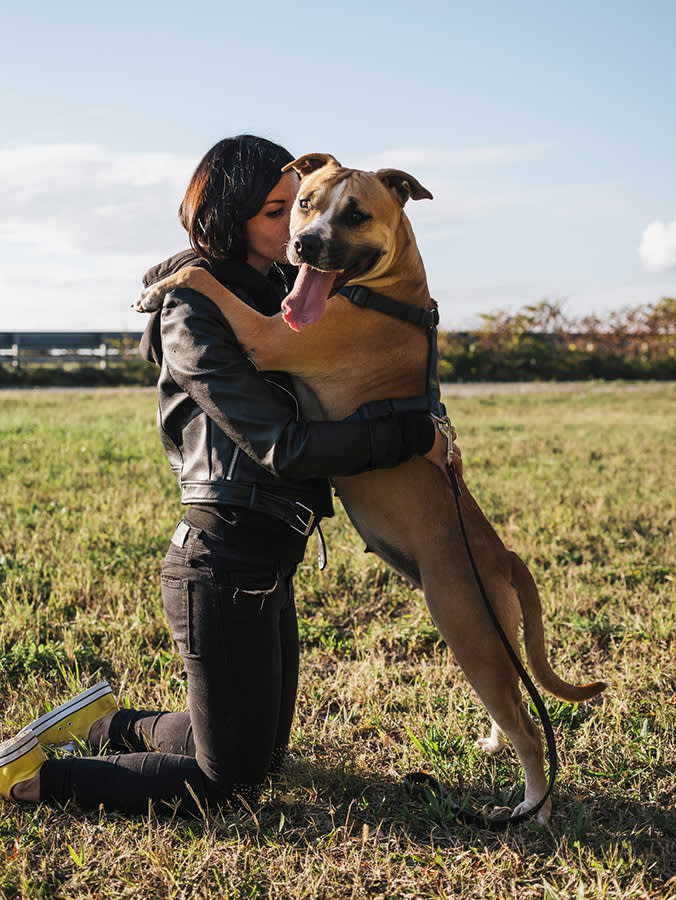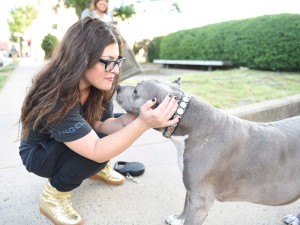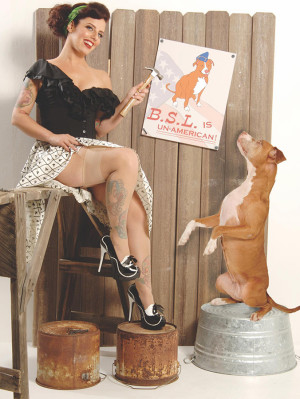7 Myths Harmful to Pit Bulls—Debunked
These sweet pups need advocates, this National Pit Bull Awareness Month, and always.

Share Article
What people expect when they see a Pit Bull and what they get are two very different things. Thanks to the incredibly harmful stereotypes that have persisted across popular culture and media over several decades, these velvet hippos often get labeled as “scary” or “aggressive,” when nothing could be further from the truth. They’re basically just glorified body pillows, always ready for a big cuddle and angling for nothing more than treats and belly rubs.
But because there clearly aren’t enough people who know this about Pitties, it’s time to get the word out. This National Pit Bull Awareness Month, we decided to put on our MythBusters caps (read: stylish berets) on. We consulted some experts to debunk the most common misconceptions about Pit Bulls in hopes that everyone will finally understand just how magical these pups are.
Myth #1: Pit Bulls are a purebred breed.
Given all the stereotypes and generalizations about their behavior, there’s a bit of irony in the fact that Pit Bulls are not even a purebred breed. Instead, they are more of a breed type with various specific breeds falling under the term’s umbrella. It’s for this reason that Pit Bulls are not recognized by the American Kennel Club. Because of the unofficial nature of this title, classification can be a bit muddy, but generally, Pitties are identified by their muscular builds, blocky heads, and shorter snouts. Of course, classifying a dog by their appearance can create a hell of a lot of issues for how they’re perceived and, crucially, how they’re regulated in certain aspects.
It also doesn’t help that these appearances apply to a number of breeds and breed types. But the five purebred breeds that commonly fall under the Pit Bull designation are American Pit Bull Terriers, American Staffordshire Terriers, Staffordshire Bull Terriers, American Bulldogs, and American Bullies. This is something that makes their natural behaviors hard to pinpoint or define accurately.

“If we’re thinking about Pit Bulls as a grouping of specific breeds then each of those breeds has their own general breed-specific tendencies,” explains veterinary behaviorist Dr. Valli Parthasarathyopens in new tab. She adds that when dealing with gene pools this mixed and varied, over time, some specific breed tendencies or personality traits can be diluted while others may be enhanced. In short, if someone says a Pittie is inherently X or Y, they’re probably full of it. Speaking of…
Myth #2: Pit Bulls are inherently vicious.
Ah yes, the subliminal prejudice hiding beneath every backhanded compliment on how “well-behaved” any Pit Bull is. They have long been subjected to decades of negative representation in the media. This ongoing bias has led some to assume they are “fighting dogs” who are naturally aggressive.
Per ASPCA’s statementopens in new tab on Pit Bulls, no dog is born violent. “While a dog’s genetics may predispose it to behave in certain ways, genetics do not exist in a vacuum. Rather, behavior develops through a complex interaction between environment and genetics,” it reads. Dr. Parthasarathy seemingly agrees with this sentiment, adding: “By and large, most Pit Bulls tend to be quite friendly and loving with their people. I don’t think that they are inherently violent dogs.” Again, they love a belly rub.
Myth #3: Most dog bites come from Pit Bulls.
In what is a natural progression from the assumption that Pitties are innately aggressive is the notion that the breed type is responsible for most canine attacks. Naturally, this is nonsense. For starters, there are no official dog-bite statistics tracking breeds and how often they’re involved in bite incidents.
For example, the Centers for Disease Control (CDC) follows the number of bite incidents and how severe they are but not the breeds involved because the organization believes it is irrelevant to the issueopens in new tab. Additionally, the American Veterinary Medical Associationopens in new tab states that, “Any dog can bite, regardless of its breed. It is the dog’s individual history, behavior, general size, number of dogs involved, and the vulnerability of the person bitten that determines the likelihood of biting and whether a dog will cause a serious bite injury.”
Myth #4: Pit Bulls have “lockjaw.”
Maybe it’s not a far leap to go from most bites to worst bites. And like a lot of sequels, this claim is even bigger and dumber than its predecessor. Many believe that Pitties can possess “lockjaw,” an idea that their mouths will forcefully latch shut if they get their paws on you like the shark in Jaws stoically devouring Robert Shaw.
Dr. Parthasarathy debunks this myth pretty directly. “People wonder about whether Pit Bulls have a jaw-locking mechanism, they don’t have a jaw-locking mechanism,” she explains. In fact, German Shepherds, Dobermans, Rottweilers, and Great Danes are all known to have stronger bites than your average American Pit Bull Terrier.
Myth #5: They can’t hang with kids or other pets.
Another fear associated with the breed type’s perceived aggression is that they should not be trusted around children. But history tells another story entirely. In fact, Pitties are so gentle and sweet to their humans that they make excellent service dogs.
Similarly, people tend to think these dogs don’t get along with other animals, either. While Dr. Parthasarathy says, once again, that a dog’s behavior is a complex mix of genetic and environmental factors, there is one organization that has tried to quantify breed activity. The American Temperament Test Societyopens in new tab ranked dog temperament by a series of tests that look at how specific breeds react to various stimuli.
It notes that the American Staffordshire Terrier and the American Pit Bull Terrier both earned high marks for affability and were among the most well-tempered dogs overall. Not to point fingers, but each was found less likely to show aggression than Golden Retrievers, Border Collies, Poodles, and countless other breeds.
Myth #6: Breed-specific legislation decreases attacks.
Not only does breed-specific legislation (BSL) not minimize dog attacks, it actively makes situations worse. Dr. Parthasarathy warns that BSL can create problems by manufacturing anxieties for pet parents that would not be there otherwise. “It’s been shown that generally breed-specific bans are not helpful in reducing dog bites,” she explains. “Bans like this make many people proactively afraid of them. It also makes people caring for these dogs more afraid that their dog will be blamed if a dog fight occurs — even if they didn’t start it.” Similar to the number of attacks, BSL is largely influenced by media representation making its implementation immensely subjective.
This is before noting how BSL disproportionately impacts Pitties and is often used specifically to target them. But don’t take our clearly aggravated word for it. Here’s what former President Barack Obama had to say on the subject in a statementopens in new tab 10 years ago. “We don’t support breed-specific legislation — research shows that bans on certain types of dogs are largely ineffective and often a waste of public resources … And the simple fact is that dogs of any breed can become dangerous when they’re intentionally or unintentionally raised to be aggressive,” he said.
Myth #7: Pit Bulls are difficult to train.
The truth is that Pitties are known to be smart pups and among the easiest to train.
Dr. Parthasarathy confirms this, pointing to many challenges that are environmental in origin rather than instinctual: “Pit Bulls are very teachable. The key is finding what motivates them positively and addressing any underlying physical or emotional conditions that may hinder their ability to learn, such as fear, anxiety, or difficulty controlling impulsivity.” She adds that they also don’t need a “firm hand” to learn. Pit Bulls are trainable like any other type of dog — with positive reinforcement.
If any of this seems too nitpicky, there’s good reason to debunk these myths. Not unlike your relative who spends far too much time on Facebook, this spread of misinformation has serious consequences. PETA has recognizedopens in new tab Pit Bulls as the most abused group of dogs in the country. The Humane Society of the United States says that Pit Bull-type dogs opens in new tab are regularly some of the most common breeds found in shelters often as a result of BSL regulations that dissuade their adoption.
Unfortunately, as we know, the longer an animal is in a shelter, the more likely they are to be euthanized. This is all to say that these anti-Pit narratives aren’t just disheartening, they can be deadly. So, please put on your own MythBusters hats as you go out into the world and advocate for these gentle pups: They are counting on you.
References:

Sean Zucker
Sean Zucker is a writer whose work has been featured in Points In Case, The Daily Drunk, Posty, and WellWell. He has an adopted Pit Bull named Banshee whose work has been featured on the kitchen floor and whose behavioral issues rival his own.
Related articles
![Deirdre Franklin dressed as a pinup model holding one of her calendars while sitting on a wooden table next to a Pitbull dog sitting on its hind legs looking up at her]()
Pinups for Pitbulls Rolls Up the Victory Curls For the Pups Who Need It Most
Back in the day, pinup models donned their victory rolls to boost wartime spirits. Now, they do it to advocate for a much-maligned dog breed. Deirdre Franklin, the founder of Pinups for Pitbulls, explains how a burlesque hobby evolved into a life-saving non-profit.
![taylour paige and her dogs]()
Zola Star Taylour Paige on How Her Dogs Taught Her About Love, Presence, and Patience
“Having dogs, rescue dogs, is not always convenient or comfortable — you have to get used to being uncomfortable. But it’s so worth it. The love is immeasurable.”
![Kelsey Darragh with her dog Hippo]()
Kelsey Darragh’s Pit Bull, Hippo, Is Her True Soulmate
The filmmaker, comedian, and mental health advocate’s boyfriend didn’t want to adopt their foster pup. She ditched the guy and kept the dog.
![Yves, a man with a lot of tattoos and a brown paisley head bandana in tan pants holding his grey Pitbull dog who is wearing a tiny cowboy hat over his shoulder]()
The Misunderstood Pit Bull Is at the Top of Yves’s Advocacy List
The model, activist, and musician on his activism philosophy: “I’ve always been drawn to those who have been left behind, forgotten, misunderstood. I relate to them on a very deep, personal level. No matter how different you are, everyone deserves a chance.”
![A woman walking 5 dogs on leashes outside.]()
Breed Does Not Equal Behavior—Here’s Why
A new study found that a dog’s breed accounts for less than 10 percent of their behavior.









